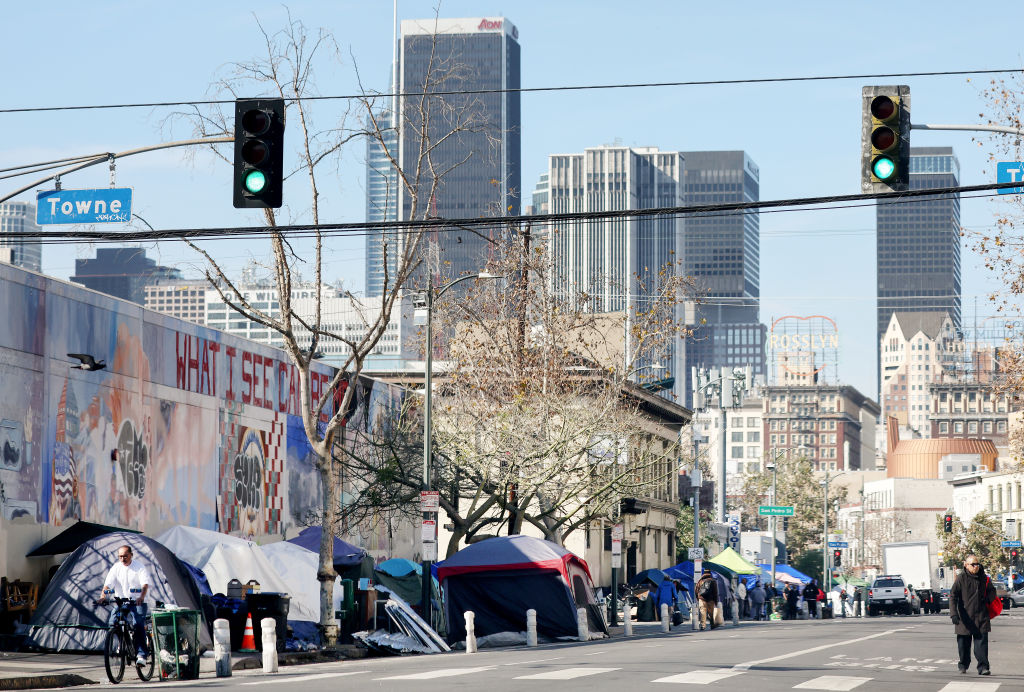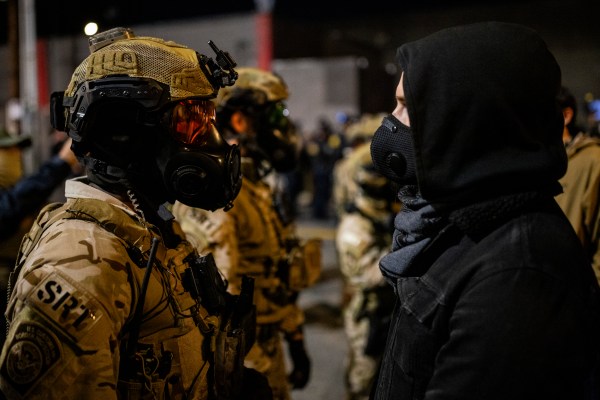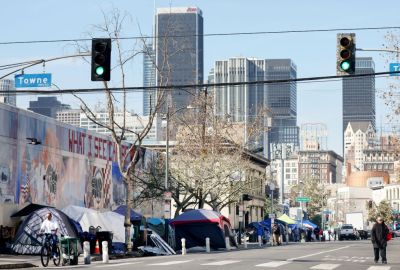Los Angeles has a new idea to tackle the city’s homeless crisis: placing the homeless in hotels with room vacancies.
The Hotel Housing Voucher Program—included in the proposed Responsible Hotel Ordinance set to appear before voters on their March 5 primary election ballot—would mandate hotels to report all vacancies to the city by 2 p.m. daily. The city would then send homeless families and individuals to hotels, along with a prepaid voucher determined at a “Fair Market Rate.”
All Los Angeles hotels would be subject to this program—from Motel 6 to the Ritz-Carlton—and prohibited from refusing homeless guests.
The Responsible Hotel Ordinance was put forward by Unite Here Local 11, a labor union representing more than 32,000 employees in various sectors such as hotels, restaurants, airports, sports arenas, and convention centers, as stated on their website.
“Hotels need to respect those vouchers and allow people to sleep in their rooms, because that’s the right thing,” Unite Here Local 11 co-president Kurt Petersen said in an interview in September.
The labor union collected enough signatures in support—15 percent of registered voters in the city—en route to the Los Angeles City Council, who faced two choices: adopting the ordinance without alteration or referring the proposal to a referendum. The City Council unanimously voted to send the proposal to the ballot box.
“A hotel can be quite effective” in providing the minimum amount of safety and security absent for those living on the street, says Gary Dean Painter, director of the University of Southern California’s Homelessness Policy Research Institute. But in the long term, he adds, “there are much better housing situations for people to be in, so they can actually rehabilitate and ultimately rejoin the job market and the housing market.”
Painter tells The Dispatch that, “If you have high levels of needs, with respect to services such as mental health services, addiction services, whatever they might need, then a hotel room is not the best location long term to receive those services and actually provide stability.”
While advocates of the program highlight its ability to provide temporary housing to those lacking shelter, they acknowledge they need to work more to fix the housing problem.
“We think this is one part of the solution—by no means do we believe this solves the homelessness crisis,” Petersen told CNN back in August.
Others are more skeptical. “A lot of bad things will happen,” warns Stephen Eide, a senior fellow at the Manhattan Institute, who notes the program could inflate hotel room prices for typical guests.
“Hotel owners have always had the city over a barrel. They always get very generous rates,” Eide tells The Dispatch. If the city pays above market rate for these hotel rooms, “that can certainly throw off hotel prices in general.”
Moreover, hotel rooms do not represent permanent housing, explains Emily Hamilton, a senior research fellow at the Mercatus Center. Simply subsidizing demand does not get to the problem driving homelessness.
“Homelessness rates are not highest in places where poverty is highest or drug use is highest,” Hamilton tells The Dispatch. “Rather, it’s in places like Los Angeles and other California cities where we see severe housing supply barriers.”
“When supply isn’t allowed to increase,” Hamilton says, “any amount of demand subsidies are just going to be shifting around who gets housing rather than addressing the root cause of scarcity.”
There are also concerns of whether hotel rooms are suitable living arrangements for homeless individuals.
“In some cases that may be true,” Eide explains. However, this is not always the case. Previously tried isolation hotel experiments in San Francisco and Vallejo, California, suggest “a lot of bad things can happen when you bring someone directly in off the street and give him his own private room where he can stay as long as he likes, do whatever he wants. That can lead to a lot of problems.”
“There's a big risk that what this result will result in is a lot of warehousing,” warns Eide, where “you just put somebody in a room and that's kind of it. So he’s off the street, he’s out of sight.”
But Eide stresses this is not all that helpful, highlighting that addressing homelessness requires active engagement rather than solely providing housing.
“That can sometimes be easier in this kind of dormitory setting than the private room,” explains Eide, “where someone can just shut the door saying ‘no, thanks. I'm going to just sit in this dark room all day long.’”
“We’re talking about seniors, students, working people,” Petersen clarified to CNN. “That’s who the voucher program would benefit the most.”
People living out of their cars—estimated by a recent study to be nearly half of L.A.’s homeless population—would also be immensely helped by this program, says Painter.
“That’s a group that would very easily benefit from a hotel, a motel room that provides obviously much better sleeping arrangements, more safety, protection for their possessions and a place where they can have an address, at least temporarily, while they’re trying to get back on their feet.”
But Eide is also concerned that if passed, the ordinance would violate the property rights of hotel owners.
“If this is a facility hotel—that’s owned by a private person,” says Eide. “Can you just requisition it and use it to respond to some sort of emergency?”
If the answer to that question is yes, “then it raises questions of ‘oh, wait a minute, who actually owns this property?’ Is this still in private ownership?”







Please note that we at The Dispatch hold ourselves, our work, and our commenters to a higher standard than other places on the internet. We welcome comments that foster genuine debate or discussion—including comments critical of us or our work—but responses that include ad hominem attacks on fellow Dispatch members or are intended to stoke fear and anger may be moderated.
With your membership, you only have the ability to comment on The Morning Dispatch articles. Consider upgrading to join the conversation everywhere.